牛津译林版(2019)必修 第二册Unit 3 Festivals and customs Grammar and usage过去将来时课件(共48张PPT)
文档属性
| 名称 | 牛津译林版(2019)必修 第二册Unit 3 Festivals and customs Grammar and usage过去将来时课件(共48张PPT) |  | |
| 格式 | pptx | ||
| 文件大小 | 505.5KB | ||
| 资源类型 | 教案 | ||
| 版本资源 | 牛津译林版(2019) | ||
| 科目 | 英语 | ||
| 更新时间 | 2023-02-22 09:54:05 | ||
图片预览


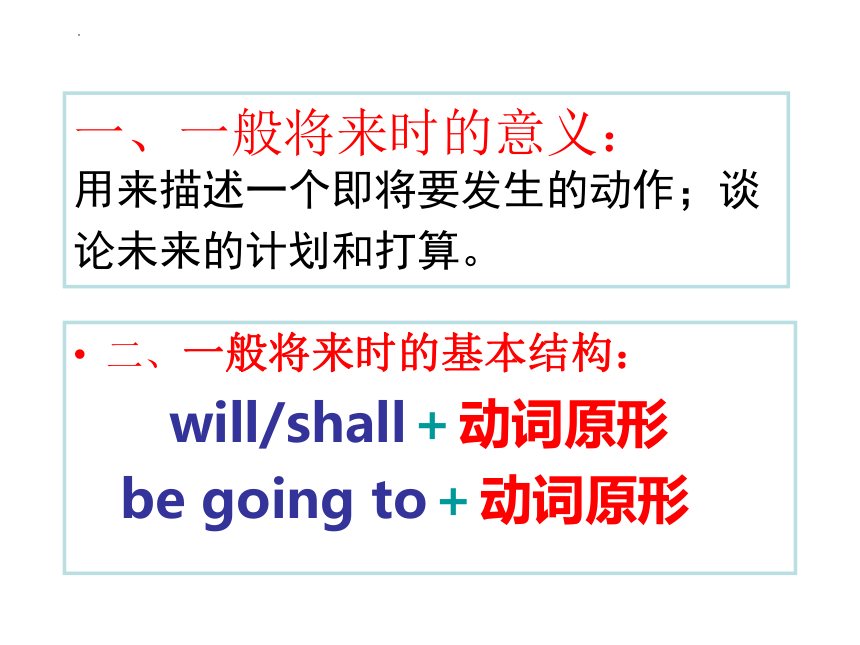
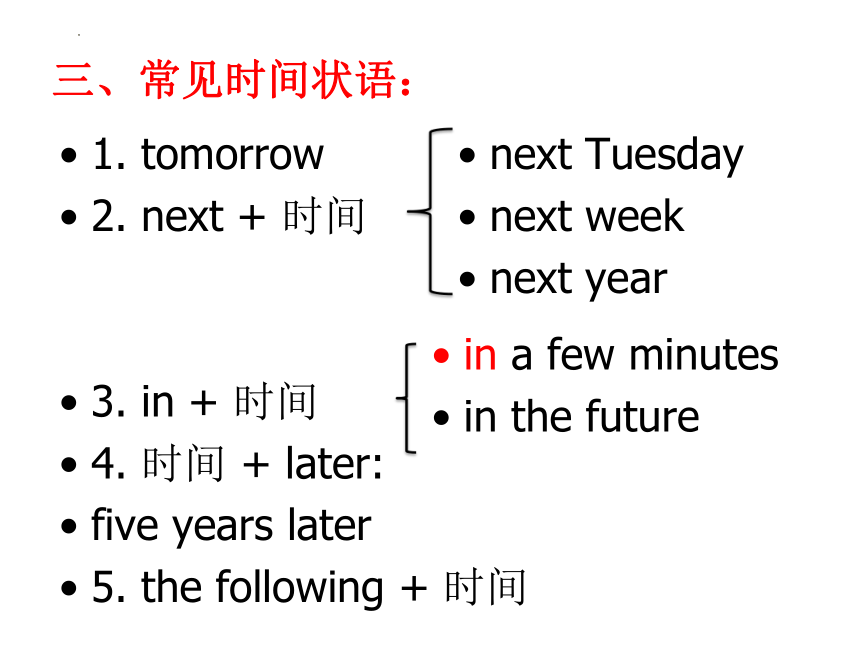
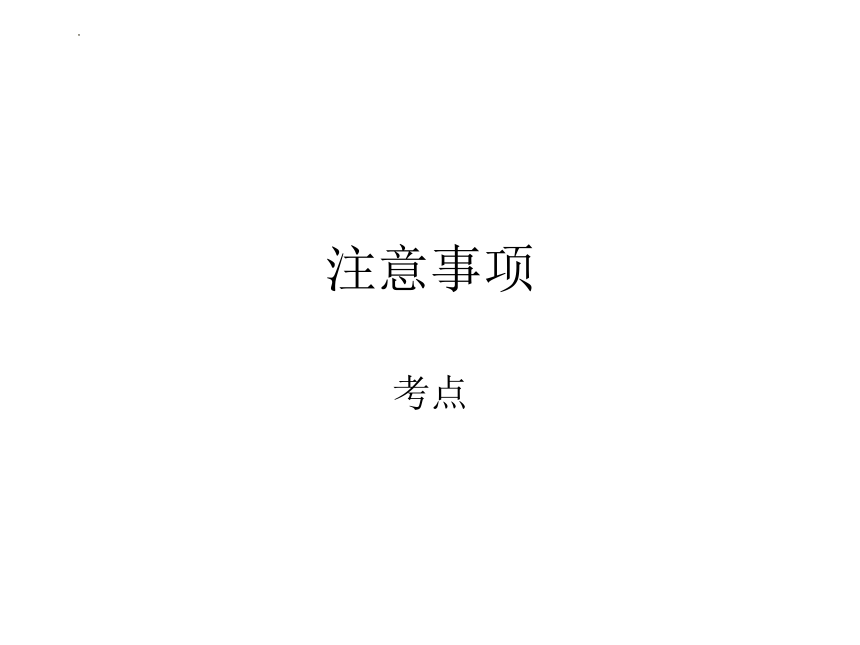
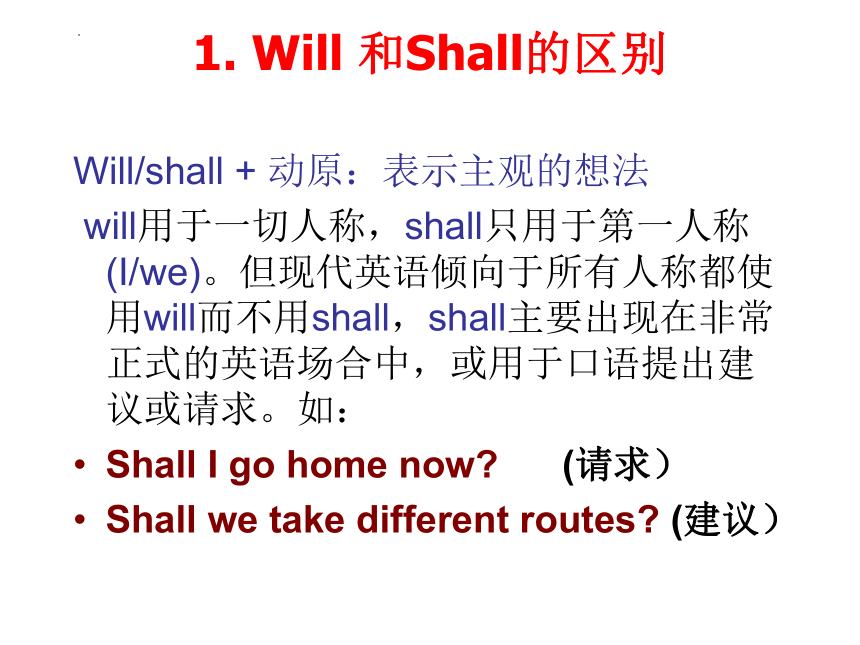
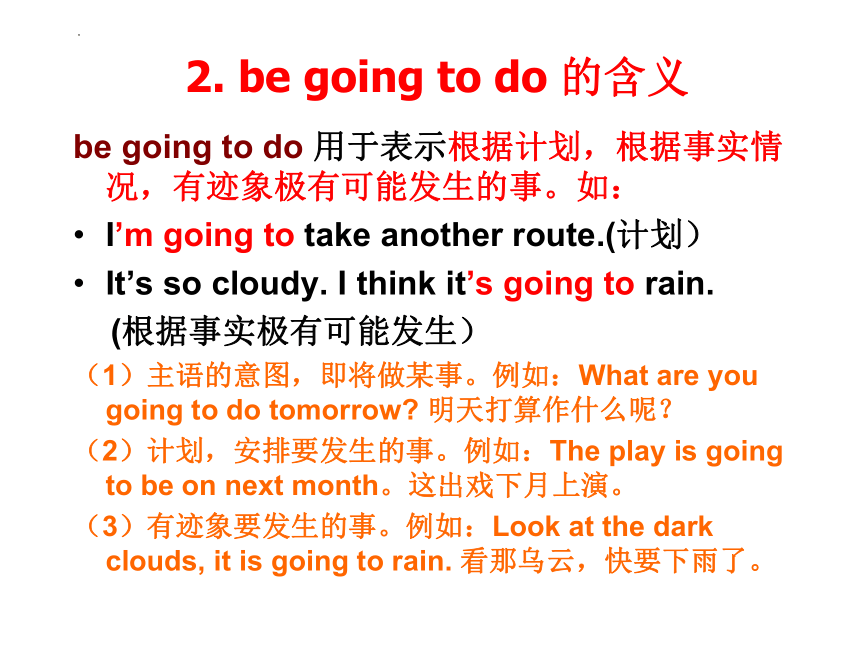
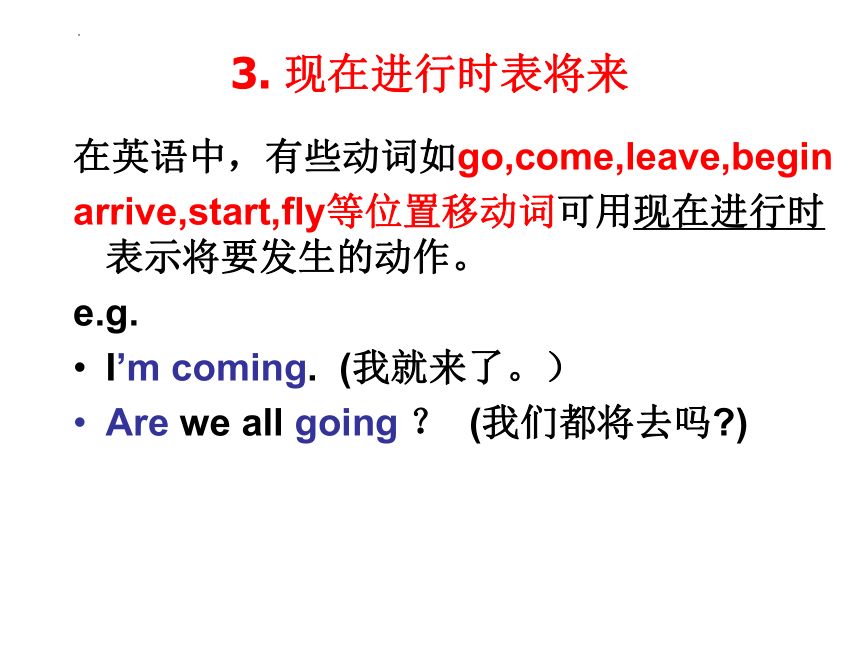
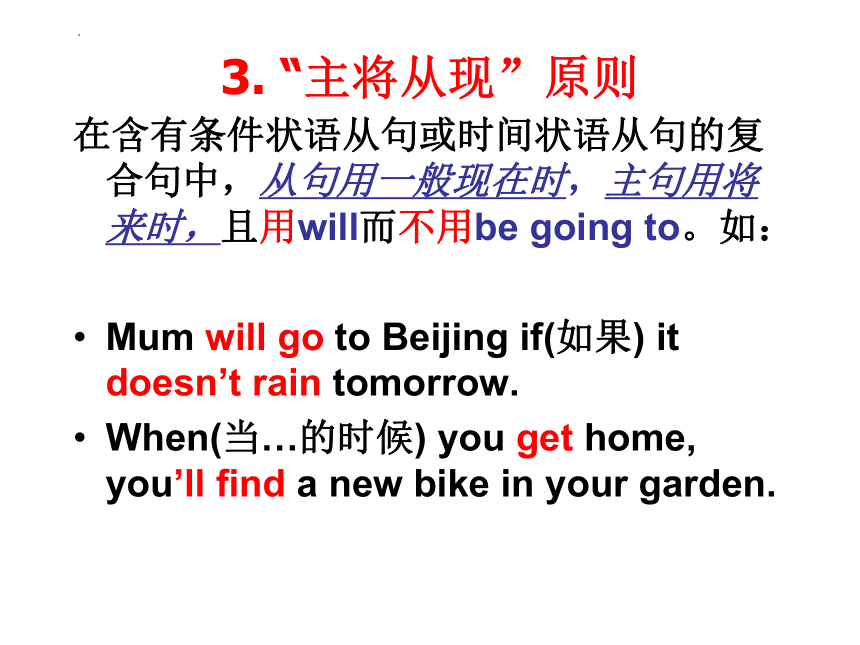
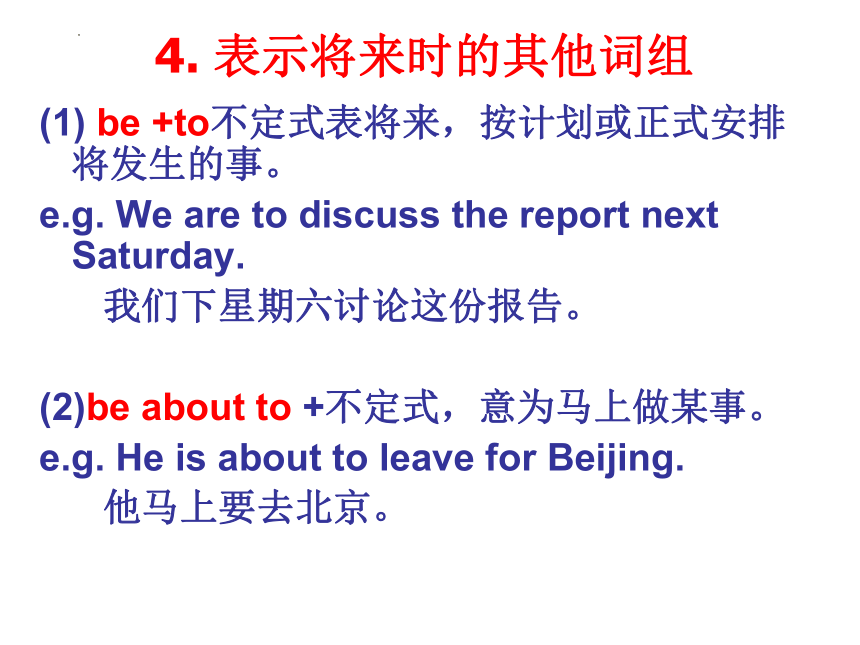
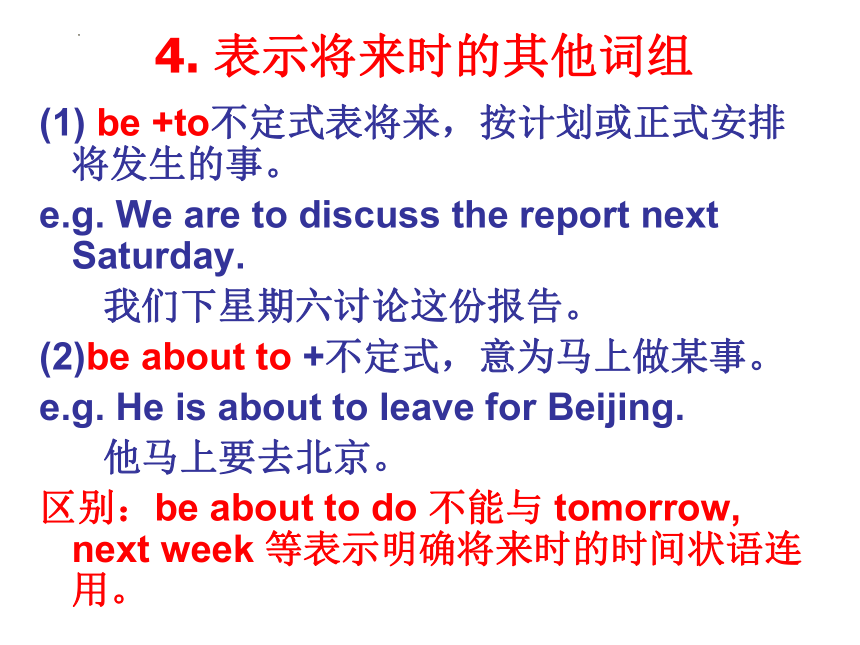
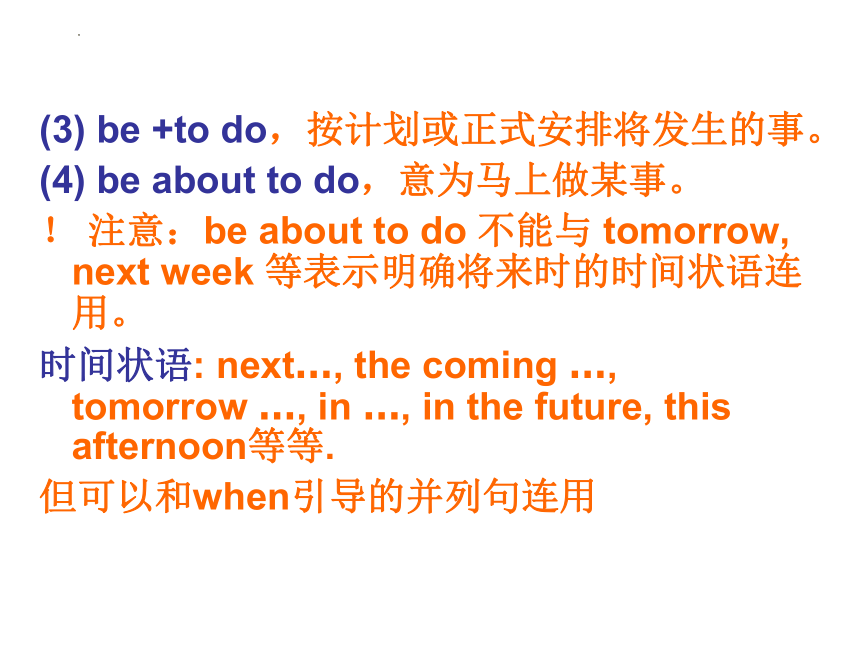
文档简介
(共48张PPT)
The Past Future Tense
过去将来时
01
一般将来时
一、一般将来时的意义:
用来描述一个即将要发生的动作;谈论未来的计划和打算。
二、一般将来时的基本结构:
will/shall+动词原形
be going to+动词原形
三、常见时间状语:
next Tuesday
next week
next year
1. tomorrow
2. next + 时间
3. in + 时间
4. 时间 + later:
five years later
5. the following + 时间
in a few minutes
in the future
注意事项
考点
1. Will 和Shall的区别
Will/shall + 动原:表示主观的想法
will用于一切人称,shall只用于第一人称(I/we)。但现代英语倾向于所有人称都使用will而不用shall,shall主要出现在非常正式的英语场合中,或用于口语提出建议或请求。如:
Shall I go home now (请求)
Shall we take different routes (建议)
2. be going to do 的含义
be going to do 用于表示根据计划,根据事实情况,有迹象极有可能发生的事。如:
I’m going to take another route.(计划)
It’s so cloudy. I think it’s going to rain.
(根据事实极有可能发生)
(1)主语的意图,即将做某事。例如:What are you going to do tomorrow 明天打算作什么呢?
(2)计划,安排要发生的事。例如:The play is going to be on next month。这出戏下月上演。
(3)有迹象要发生的事。例如:Look at the dark clouds, it is going to rain. 看那乌云,快要下雨了。
3. 现在进行时表将来
在英语中,有些动词如go,come,leave,begin
arrive,start,fly等位置移动词可用现在进行时表示将要发生的动作。
e.g.
I’m coming. (我就来了。)
Are we all going ? (我们都将去吗 )
3. “主将从现”原则
在含有条件状语从句或时间状语从句的复合句中,从句用一般现在时,主句用将来时,且用will而不用be going to。如:
Mum will go to Beijing if(如果) it doesn’t rain tomorrow.
When(当…的时候) you get home, you’ll find a new bike in your garden.
4. 表示将来时的其他词组
(1) be +to不定式表将来,按计划或正式安排将发生的事。
e.g. We are to discuss the report next Saturday.
我们下星期六讨论这份报告。
(2)be about to +不定式,意为马上做某事。
e.g. He is about to leave for Beijing.
他马上要去北京。
4. 表示将来时的其他词组
(1) be +to不定式表将来,按计划或正式安排将发生的事。
e.g. We are to discuss the report next Saturday.
我们下星期六讨论这份报告。
(2)be about to +不定式,意为马上做某事。
e.g. He is about to leave for Beijing.
他马上要去北京。
区别:be about to do 不能与 tomorrow, next week 等表示明确将来时的时间状语连用。
(3) be +to do,按计划或正式安排将发生的事。
(4) be about to do,意为马上做某事。
! 注意:be about to do 不能与 tomorrow, next week 等表示明确将来时的时间状语连用。
时间状语: next…, the coming …, tomorrow …, in …, in the future, this afternoon等等.
但可以和when引导的并列句连用
一般将来时的否定、
疑问及回答
一般将来时的肯定句
I will say= I’ll say
You will see= You’ll see
He will think= He’ll think
She will talk= She’ll talk
It’ll run = …
They’ll chat = …
We will make = …
否定句
I will not say= I won’t /w nt/ say
You will not see= You won’t see
He will not think= He won’t think
She will not talk= She won’t talk
It will run 改否定句 …
They’ll chat改否定句 …
We’ll make改否定句 …
一般疑问句及回答
I will say… → Will you say … Yes, I will.
You will see… → Will I see … No, you won’t.
He will think… → Will he think… Yes, he will.
She will talk → Will she talk… No, she won’t.
It will run 改疑问句并回答 …
They’ll chat改疑问句并回答 …
We’ll make改疑问句并回答 …
一般将来时 小结
1、shall/will + 动词原形
shall用于第一人称,常被will 所代替。
Which part shall I read first?
Will you be at home at seven this evening
2、be going to do
(1)主语的意图,即将做某事。
(2)有迹象要发生的事。
will
主将从现用法时 ,主句只能用will,从句用一般现在时表将来。
一般将来时 小结
3、be +to do,按计划或正式安排将发生的事。
4、be about to do,意为马上做某事。
! 注意:be about to do 不能与 tomorrow, next week 等表示明确将来时的时间状语连用。
5. 时间状语: next…, the coming …, tomorrow …, in …, in the future, this afternoon等等.
02
过去将来时
He told us that he would become a doctor.
过去将来时:表示从过去的时间看待将来要发生的动作或状态,形式是把will /be going to do改为过去式
1. will/shall + do would/should + do
2. am/is/are going to + do
was/were going to + do
过去将来时的构成:
should/would + 动词原形
was/were going to + 动词原形
should用于第一人称
would用于所有人称
1、would + 动词原形
对过去某一时刻来说将要进行或发生的动作、状态。表示主观的意愿、想法。
It was four o’clock. Soon the sun would come out.
2、was/were going to do
(1)过去的“意图”或“预见”即将做某事。
(2)有迹象要发生的事。
He told the sun was going to come out.
1.肯定句:
主语+would(should)+动词原形+其他
2.否定句:
主语+would(should)not+动词原形 +其他
3.疑问句:
Would(Should)+主语+动词原形+其他
4.特殊疑问句:
Wh-+would(should)+主语+动词原形+其他
should/would + 动词原形
1.肯定句:主语+was/were going to+动词原形+其他
2.否定句:主语+was/were+not going to+动词原形+其他
3.疑问句:Was/Were+主语+going to+动词原形+其他
4.特殊疑问句:Wh-+was/were+主语+going to+动词原形+其他
was/were going to + 动词原形
These former knowledge was to change my life.
This was the beginning of another ordinary day in New York City, but this day was to be different.
指过去的计划安排或注定要发生的事情。
表示”应该,可能,也许,必须“;用于if条件状语从句中,表示”想要“
was/were to do
was/were going to do
句子翻译:
1. No one is to leave the building.
2. You are to be back by 10 o'clock.
3. If you are to see him, you must come early.
4. You are not to smoke in this room.
5. Such books are to be found in the library.
was/were to do
谁也不能离开这栋楼房。
你必须10点以前回来。
如果你想要见他,你必须早点来。
你不应该在这间房里抽烟。
你不应该在这间房里抽烟。
was/were about to do
I felt that something terrible was about to happen.
I was on the point of going out when the phone rang.
He was just about to dive when he saw the shark.
was/were on the point of doing
表即将发生的事情。
这种结构不能和表示将来的时间状语连用,但可以和when引导的时间状语从句连用。
was/were doing
She told me she was coming to see me.
He hurried into the carriage. The train was leaving in a few minutes.
It seemed to me that our team was losing.
表示位移的动词come, go, leave, arrive, reture, start以及瞬间动词win, lose, die, finish, happen等可用过去进行时表达过去将来的含义。
一般将来时 小结
3、be +to do,按计划或正式安排将发生的事。
4、be about to do,意为马上做某事。
! 注意:be about to do 不能与 tomorrow, next week 等表示明确将来时的时间状语连用。
5. 时间状语: next…, the coming …, tomorrow …, in …, in the future, this afternoon等等.
过去将来时的用法:
表示从过去某一时间看将要发生的动作或存在
的状态
I told them that I would go to Shanghai for holiday.
Whenever he had time, he would do some reading.
2. 用“was/were going to + 动词原形”, 表示过去打
算或准备要做的事或者对过去迹象的预测。
He said he was going to see her this afternoon.
He said it was going to rain.
请你观察过去将来时态的用法:
1. 过去将来时常用于宾语从句中
We didn’t know whether they were going to give
us a talk this afternoon.
I didn’t know when he would leave for Shanghai.
2. 过去将来时常用于间接引语中
He said he would come back the next day.
He told me that he would go back soon.
学习过去将来时需要注意的问题:
1. 过去将来时和一般将来时的用法区别
I _____________________________ _______ (write) a
letter next week.
She said she _______________________________ (write)
a letter the next week.
will /shall write/am going to write
would write/was going to write
三、常见时间状语:
next Tuesday
next week
next year
1. tomorrow
2. next + 时间
3. in + 时间
4. 时间 + later:
five years later
5. the following + 时间
in a few minutes
in the future
第二天晚上8点
10点钟以后
第二天,第二个周五,下一周/月/年
第二天, 接下来的一周/月/年
两天后, 三周后, 四年后
常用时间状语
at eight the next night
the next day/ Friday/ week/ month/ year
the following day/ week /month/ year
two days /three weeks/ four years later
after 10 o'clock
第二天晚上8点
10点钟以后
第二天,第二个周五,下一周/月/年
第二天, 接下来的一周/月/年
两天后, 三周后, 四年后
常用时间状语
at eight the next night
the next day/ Friday/ week/ month/ year
the following day/ week /month/ year
two days /three weeks/ four years later
after 10 o'clock
注意:在表示未来在"某时刻"(不是时间长度)之后,或者"某事件"之后,不能用in,须用after
用法1
1. 和表示过去将来时间状语连用,多见于从句,特别是宾语从句中(当主句是过去时,宾语从句表示将要发生的事,用过去将来时)
He said he__________ to the hometown the next day.
We never imagined he_______ a doctor in the future.
A: She washed the car, didn’t she
B: No, she forgot. But she said she____________ it the next day.
would wash
/was going to wash
would return
would be
用法2
2. 用于转述过去时间,他人所说的话
A: She washed the car, didn’t she
B: No, she forgot. But she said she____________ it the next day.
would wash
/was going to wash
注意:直接引语变成间接引语时,说话的内容的时态以主句为主。
“We’re going to have a test next week.”
The teacher said.
The teacher said that we _________ (have) a test the next week.
“Coke will make a trip to the seaside.”
Coke told us.
Coke told us that he ___________ (make) a trip to the seaside.
were going to have
/would have
would make
/was going to make
“A parade will take place in the square soon”.The journalist reported.
The journalist reported that a parade ______________________ (take place) to our city soon.
The boy asked.“Why won’t his friends help him when he is in trouble ”
The boy asked why his friends _______________________ (not help) him when he _______(be) in trouble.
would/was going to take place
wouldn’t/weren’t going to help
was
3.过去将来时,用于虚拟语气中
If I were you, I would not do that.
要是我是你的话,我就不会那样做。
If he were here, he would show us how to do it.
如果他在这儿,他就会向我们展示该如何做了。
用法3
3.过去将来时常可用来表示过去习惯性的动作。此时,不管什么人称,一律用would
他一有时间,总是看书。
Whenever he had time,he would do some reading.
当我还是小孩时,我总和他一起玩。
I would play with him when I was a child.
用法3
过去将来时典型错误例析
1. 我们不知道他是否要在会上发言。
误:We didn’t know whether he is going to speak at the meeting.
正:We didn’t know whether he was going to speak at the meeting.
析:该句主句为过去时,且宾语从句表示从过去某个时间看来将要发生的动作,所以从句要用过去将来时态。
2. 老师问汤姆长大后准备干什么。
误:The teacher asked Tom what he was going to be when he would grow up.
正:The teacher asked Tom what he was going to be when he grew up.
析:在时间状语从句中,常用一般过去时表示在过去看来将要发生的动作。
3. 他们说如果下星期天不下雨他们就去农场。
误:They said that they were going to the farm if it would not rain the next Sunday.
正:They said that they were going to the farm if it didn’t rain the next Sunday.
析:在条件状语从句中,也常用一般过去时表示在过去看来将要发生的动作。
4. 王林打电话告诉她妈妈,她要买一些书。
误:Wang Lin rang up to tell her mother that she should buy some books.
正:Wang Lin rang up to tell her mother that she would buy some books.
析:过去将来时可以由“助动词should/would+动词原形”构成,但should一般只用于第一人称。而would可用于各种人称。
用所给动词的适当形式填空
1. Miss Zhang said she __________(visit) the Great Wall next summer.
2. She told him that she ___________(not stay) here for long.
3. I wasn’t sure whether Lucy __________ (come) the next year.
4. The scientists said the world’s population ____________ (grow) slowly in future.
would visit
wouldn’t stay
would come
would grow
Jim决定他们下个月坐飞机去英国。
Jim decided_______________________.
她66岁了。三年后,她是69岁。
She was sixty-six. ____________________.
科学家说没有人知道一百年之后将会发生什么事。
Scientists said ___________________.
老师问汤姆长大后准备干什么.
The teacher asked Tom _______________
她告诉我们,如果下雨,她就不和我们一起去了。
She told us _________________________.
Jim决定他们下个月坐飞机去英国。
Jim decided_______________________.
她66岁了。三年后,她是69岁。
She was sixty-six. ____________________.
科学家说没有人知道一百年之后将会发生什么事。
Scientists said ___________________.
老师问汤姆长大后准备干什么.
The teacher asked Tom _______________
她告诉我们,如果下雨,她就不和我们一起去了。
She told us _________________________.
Jim decided they were going to/would fly to Britain the next month.
In three years, she was going to/would be 69 years old.
Scientists said nobody knew what would happen in one hundred years’ time.
The teacher asked what Tom was going to/would do when he grew up.
She told us if it rained, she wouldn’t go with us.
The Past Future Tense
过去将来时
01
一般将来时
一、一般将来时的意义:
用来描述一个即将要发生的动作;谈论未来的计划和打算。
二、一般将来时的基本结构:
will/shall+动词原形
be going to+动词原形
三、常见时间状语:
next Tuesday
next week
next year
1. tomorrow
2. next + 时间
3. in + 时间
4. 时间 + later:
five years later
5. the following + 时间
in a few minutes
in the future
注意事项
考点
1. Will 和Shall的区别
Will/shall + 动原:表示主观的想法
will用于一切人称,shall只用于第一人称(I/we)。但现代英语倾向于所有人称都使用will而不用shall,shall主要出现在非常正式的英语场合中,或用于口语提出建议或请求。如:
Shall I go home now (请求)
Shall we take different routes (建议)
2. be going to do 的含义
be going to do 用于表示根据计划,根据事实情况,有迹象极有可能发生的事。如:
I’m going to take another route.(计划)
It’s so cloudy. I think it’s going to rain.
(根据事实极有可能发生)
(1)主语的意图,即将做某事。例如:What are you going to do tomorrow 明天打算作什么呢?
(2)计划,安排要发生的事。例如:The play is going to be on next month。这出戏下月上演。
(3)有迹象要发生的事。例如:Look at the dark clouds, it is going to rain. 看那乌云,快要下雨了。
3. 现在进行时表将来
在英语中,有些动词如go,come,leave,begin
arrive,start,fly等位置移动词可用现在进行时表示将要发生的动作。
e.g.
I’m coming. (我就来了。)
Are we all going ? (我们都将去吗 )
3. “主将从现”原则
在含有条件状语从句或时间状语从句的复合句中,从句用一般现在时,主句用将来时,且用will而不用be going to。如:
Mum will go to Beijing if(如果) it doesn’t rain tomorrow.
When(当…的时候) you get home, you’ll find a new bike in your garden.
4. 表示将来时的其他词组
(1) be +to不定式表将来,按计划或正式安排将发生的事。
e.g. We are to discuss the report next Saturday.
我们下星期六讨论这份报告。
(2)be about to +不定式,意为马上做某事。
e.g. He is about to leave for Beijing.
他马上要去北京。
4. 表示将来时的其他词组
(1) be +to不定式表将来,按计划或正式安排将发生的事。
e.g. We are to discuss the report next Saturday.
我们下星期六讨论这份报告。
(2)be about to +不定式,意为马上做某事。
e.g. He is about to leave for Beijing.
他马上要去北京。
区别:be about to do 不能与 tomorrow, next week 等表示明确将来时的时间状语连用。
(3) be +to do,按计划或正式安排将发生的事。
(4) be about to do,意为马上做某事。
! 注意:be about to do 不能与 tomorrow, next week 等表示明确将来时的时间状语连用。
时间状语: next…, the coming …, tomorrow …, in …, in the future, this afternoon等等.
但可以和when引导的并列句连用
一般将来时的否定、
疑问及回答
一般将来时的肯定句
I will say= I’ll say
You will see= You’ll see
He will think= He’ll think
She will talk= She’ll talk
It’ll run = …
They’ll chat = …
We will make = …
否定句
I will not say= I won’t /w nt/ say
You will not see= You won’t see
He will not think= He won’t think
She will not talk= She won’t talk
It will run 改否定句 …
They’ll chat改否定句 …
We’ll make改否定句 …
一般疑问句及回答
I will say… → Will you say … Yes, I will.
You will see… → Will I see … No, you won’t.
He will think… → Will he think… Yes, he will.
She will talk → Will she talk… No, she won’t.
It will run 改疑问句并回答 …
They’ll chat改疑问句并回答 …
We’ll make改疑问句并回答 …
一般将来时 小结
1、shall/will + 动词原形
shall用于第一人称,常被will 所代替。
Which part shall I read first?
Will you be at home at seven this evening
2、be going to do
(1)主语的意图,即将做某事。
(2)有迹象要发生的事。
will
主将从现用法时 ,主句只能用will,从句用一般现在时表将来。
一般将来时 小结
3、be +to do,按计划或正式安排将发生的事。
4、be about to do,意为马上做某事。
! 注意:be about to do 不能与 tomorrow, next week 等表示明确将来时的时间状语连用。
5. 时间状语: next…, the coming …, tomorrow …, in …, in the future, this afternoon等等.
02
过去将来时
He told us that he would become a doctor.
过去将来时:表示从过去的时间看待将来要发生的动作或状态,形式是把will /be going to do改为过去式
1. will/shall + do would/should + do
2. am/is/are going to + do
was/were going to + do
过去将来时的构成:
should/would + 动词原形
was/were going to + 动词原形
should用于第一人称
would用于所有人称
1、would + 动词原形
对过去某一时刻来说将要进行或发生的动作、状态。表示主观的意愿、想法。
It was four o’clock. Soon the sun would come out.
2、was/were going to do
(1)过去的“意图”或“预见”即将做某事。
(2)有迹象要发生的事。
He told the sun was going to come out.
1.肯定句:
主语+would(should)+动词原形+其他
2.否定句:
主语+would(should)not+动词原形 +其他
3.疑问句:
Would(Should)+主语+动词原形+其他
4.特殊疑问句:
Wh-+would(should)+主语+动词原形+其他
should/would + 动词原形
1.肯定句:主语+was/were going to+动词原形+其他
2.否定句:主语+was/were+not going to+动词原形+其他
3.疑问句:Was/Were+主语+going to+动词原形+其他
4.特殊疑问句:Wh-+was/were+主语+going to+动词原形+其他
was/were going to + 动词原形
These former knowledge was to change my life.
This was the beginning of another ordinary day in New York City, but this day was to be different.
指过去的计划安排或注定要发生的事情。
表示”应该,可能,也许,必须“;用于if条件状语从句中,表示”想要“
was/were to do
was/were going to do
句子翻译:
1. No one is to leave the building.
2. You are to be back by 10 o'clock.
3. If you are to see him, you must come early.
4. You are not to smoke in this room.
5. Such books are to be found in the library.
was/were to do
谁也不能离开这栋楼房。
你必须10点以前回来。
如果你想要见他,你必须早点来。
你不应该在这间房里抽烟。
你不应该在这间房里抽烟。
was/were about to do
I felt that something terrible was about to happen.
I was on the point of going out when the phone rang.
He was just about to dive when he saw the shark.
was/were on the point of doing
表即将发生的事情。
这种结构不能和表示将来的时间状语连用,但可以和when引导的时间状语从句连用。
was/were doing
She told me she was coming to see me.
He hurried into the carriage. The train was leaving in a few minutes.
It seemed to me that our team was losing.
表示位移的动词come, go, leave, arrive, reture, start以及瞬间动词win, lose, die, finish, happen等可用过去进行时表达过去将来的含义。
一般将来时 小结
3、be +to do,按计划或正式安排将发生的事。
4、be about to do,意为马上做某事。
! 注意:be about to do 不能与 tomorrow, next week 等表示明确将来时的时间状语连用。
5. 时间状语: next…, the coming …, tomorrow …, in …, in the future, this afternoon等等.
过去将来时的用法:
表示从过去某一时间看将要发生的动作或存在
的状态
I told them that I would go to Shanghai for holiday.
Whenever he had time, he would do some reading.
2. 用“was/were going to + 动词原形”, 表示过去打
算或准备要做的事或者对过去迹象的预测。
He said he was going to see her this afternoon.
He said it was going to rain.
请你观察过去将来时态的用法:
1. 过去将来时常用于宾语从句中
We didn’t know whether they were going to give
us a talk this afternoon.
I didn’t know when he would leave for Shanghai.
2. 过去将来时常用于间接引语中
He said he would come back the next day.
He told me that he would go back soon.
学习过去将来时需要注意的问题:
1. 过去将来时和一般将来时的用法区别
I _____________________________ _______ (write) a
letter next week.
She said she _______________________________ (write)
a letter the next week.
will /shall write/am going to write
would write/was going to write
三、常见时间状语:
next Tuesday
next week
next year
1. tomorrow
2. next + 时间
3. in + 时间
4. 时间 + later:
five years later
5. the following + 时间
in a few minutes
in the future
第二天晚上8点
10点钟以后
第二天,第二个周五,下一周/月/年
第二天, 接下来的一周/月/年
两天后, 三周后, 四年后
常用时间状语
at eight the next night
the next day/ Friday/ week/ month/ year
the following day/ week /month/ year
two days /three weeks/ four years later
after 10 o'clock
第二天晚上8点
10点钟以后
第二天,第二个周五,下一周/月/年
第二天, 接下来的一周/月/年
两天后, 三周后, 四年后
常用时间状语
at eight the next night
the next day/ Friday/ week/ month/ year
the following day/ week /month/ year
two days /three weeks/ four years later
after 10 o'clock
注意:在表示未来在"某时刻"(不是时间长度)之后,或者"某事件"之后,不能用in,须用after
用法1
1. 和表示过去将来时间状语连用,多见于从句,特别是宾语从句中(当主句是过去时,宾语从句表示将要发生的事,用过去将来时)
He said he__________ to the hometown the next day.
We never imagined he_______ a doctor in the future.
A: She washed the car, didn’t she
B: No, she forgot. But she said she____________ it the next day.
would wash
/was going to wash
would return
would be
用法2
2. 用于转述过去时间,他人所说的话
A: She washed the car, didn’t she
B: No, she forgot. But she said she____________ it the next day.
would wash
/was going to wash
注意:直接引语变成间接引语时,说话的内容的时态以主句为主。
“We’re going to have a test next week.”
The teacher said.
The teacher said that we _________ (have) a test the next week.
“Coke will make a trip to the seaside.”
Coke told us.
Coke told us that he ___________ (make) a trip to the seaside.
were going to have
/would have
would make
/was going to make
“A parade will take place in the square soon”.The journalist reported.
The journalist reported that a parade ______________________ (take place) to our city soon.
The boy asked.“Why won’t his friends help him when he is in trouble ”
The boy asked why his friends _______________________ (not help) him when he _______(be) in trouble.
would/was going to take place
wouldn’t/weren’t going to help
was
3.过去将来时,用于虚拟语气中
If I were you, I would not do that.
要是我是你的话,我就不会那样做。
If he were here, he would show us how to do it.
如果他在这儿,他就会向我们展示该如何做了。
用法3
3.过去将来时常可用来表示过去习惯性的动作。此时,不管什么人称,一律用would
他一有时间,总是看书。
Whenever he had time,he would do some reading.
当我还是小孩时,我总和他一起玩。
I would play with him when I was a child.
用法3
过去将来时典型错误例析
1. 我们不知道他是否要在会上发言。
误:We didn’t know whether he is going to speak at the meeting.
正:We didn’t know whether he was going to speak at the meeting.
析:该句主句为过去时,且宾语从句表示从过去某个时间看来将要发生的动作,所以从句要用过去将来时态。
2. 老师问汤姆长大后准备干什么。
误:The teacher asked Tom what he was going to be when he would grow up.
正:The teacher asked Tom what he was going to be when he grew up.
析:在时间状语从句中,常用一般过去时表示在过去看来将要发生的动作。
3. 他们说如果下星期天不下雨他们就去农场。
误:They said that they were going to the farm if it would not rain the next Sunday.
正:They said that they were going to the farm if it didn’t rain the next Sunday.
析:在条件状语从句中,也常用一般过去时表示在过去看来将要发生的动作。
4. 王林打电话告诉她妈妈,她要买一些书。
误:Wang Lin rang up to tell her mother that she should buy some books.
正:Wang Lin rang up to tell her mother that she would buy some books.
析:过去将来时可以由“助动词should/would+动词原形”构成,但should一般只用于第一人称。而would可用于各种人称。
用所给动词的适当形式填空
1. Miss Zhang said she __________(visit) the Great Wall next summer.
2. She told him that she ___________(not stay) here for long.
3. I wasn’t sure whether Lucy __________ (come) the next year.
4. The scientists said the world’s population ____________ (grow) slowly in future.
would visit
wouldn’t stay
would come
would grow
Jim决定他们下个月坐飞机去英国。
Jim decided_______________________.
她66岁了。三年后,她是69岁。
She was sixty-six. ____________________.
科学家说没有人知道一百年之后将会发生什么事。
Scientists said ___________________.
老师问汤姆长大后准备干什么.
The teacher asked Tom _______________
她告诉我们,如果下雨,她就不和我们一起去了。
She told us _________________________.
Jim决定他们下个月坐飞机去英国。
Jim decided_______________________.
她66岁了。三年后,她是69岁。
She was sixty-six. ____________________.
科学家说没有人知道一百年之后将会发生什么事。
Scientists said ___________________.
老师问汤姆长大后准备干什么.
The teacher asked Tom _______________
她告诉我们,如果下雨,她就不和我们一起去了。
She told us _________________________.
Jim decided they were going to/would fly to Britain the next month.
In three years, she was going to/would be 69 years old.
Scientists said nobody knew what would happen in one hundred years’ time.
The teacher asked what Tom was going to/would do when he grew up.
She told us if it rained, she wouldn’t go with us.
